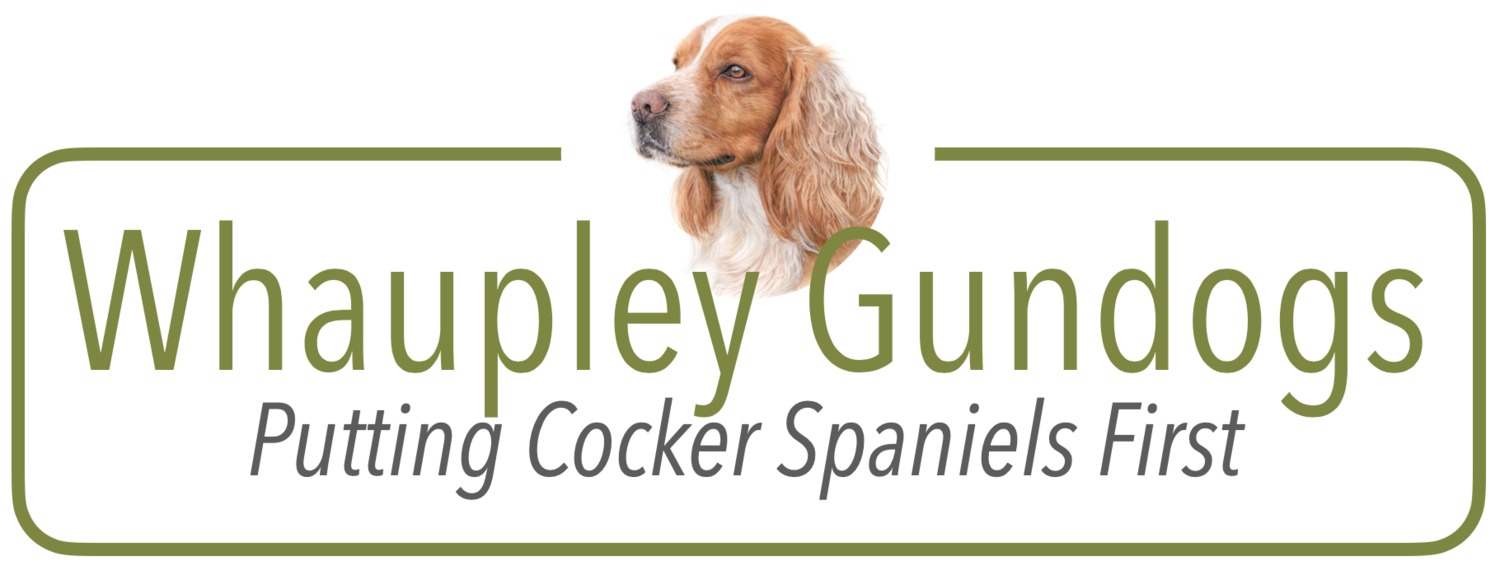Puppy retrieving
Whilst our pups are growing up we do quite a lot of retrieving with them. Our aim is to get them keen on retrieving, and indeed hunting for a retrieve, at an early age. Most spaniels nowadays are naturally good retrievers but it is surprising how many people seem to struggle to get young dogs retrieving cleanly and efficiently. I am sure that most of the retrieving problems we see are caused by the owner of the dog rather than the dog itself. A very large percentage of dogs that we get in for training either will not retrieve or are untidy with poor deliveries. Science was not one of my strong points at school but I do remember a slightly demented and frustrated physics teacher saying something about “Every action has an equal and opposite reaction”.
This is very relevant in gundog training. Everything we do in training dog has an effect and not necessarily the one we want. For example, if we allow a young pup to hunt all the time with no retrieving they can become superb hunters with little interest in picking things up. If we make too much of an issue about a certain aspect of retrieving early on we can have a negative effect on the delivery and if we punish or intimidate a young dog during early retrieving training we can cause serious problems later on. In later articles I will cover the subject of “hard mouth” and damaging game and I am sure that nearly all of these problems are caused by the handler, often by being too hard on the dog. At these early stages try not to make too much of an issue of anything with the young dog.
It is important at the puppy stage to keep things fun. We start by giving the pups easy retrieves in an enclosed area where there are no distractions and the pup has no option but to bring the object back without running off or trying to bury it. We always let the pup run in as this improves its confidence and enthusiasm for what it is doing without confusing it. I will usually sit down and let the pup come right up to me and allow the pup to hold onto the dummy. I am sure that some of the problems with pups turning their back on the handler or not coming right up close are because some people are in too much of a hurry to take the dummy off the pup. The pup possibly feels that there is no point in taking the dummy back because he or she will lose it straight away. I let the pup hold onto the dummy and sometimes pick up the pup and make a fuss of it whilst it still holds the dummy. On other occasions I will gently take the dummy and then give it back to the pup. Quite often I see people almost panic in their hurry to get the dummy off the pup and snatch it. Inevitably the pup then feels reluctant to take the dummy back and this can be the start of retrieving problems.
It is easy to forget that some of us are well over six feet tall and the pup only a few inches so it is important to get down more to the level of the pup when you are doing early retrieving exercises. It must be very intimidating for a pup to have somebody towering over them. When an adult dog tries to intimidate another it will stand up and try to make itself as tall as possible, so it makes sense to drop down and try to turn slightly away to encourage the pup in rather than risk intimidating it.
Once the pup is delivering a dummy well we continue the exercises, but also start to make them a little more difficult by increasing the distance and also giving them retrieves where they have to start a little hunting for the dummy. It is important to maintain the pup’s enthusiasm for retrieving but also not to overdo it and risk putting the pup off altogether through boredom or wind it up by doing too much. We are looking for a pup that by the time it is about eight months is a keen and natural retriever and will enthusiastically hunt for a thrown dummy. Most well-bred spaniel pups will thrive on being raised like this and will end up as excellent retrievers. I am always very careful not to discipline a young dog whilst it is doing basic retrieving exercises. It doesn’t really matter too much what you use for this basic retrieving, tennis balls, small rubber balls, anything suitable will do but I try to get them keen on a small canvas dummy at an early stage for the only reason that this makes later training more simple.
My aim is to end up with a pup around seven months or so that is well rounded, confident and bold without being too headstrong and independent, that will hunt without hunting totally for itself out of control and will confidently and enthusiastically retrieve back to hand. Once I have reached this stage I will start to move onto more formal training.

